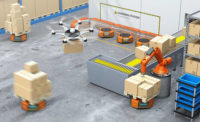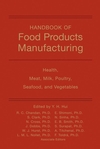The food manufacturing industry is undergoing a significant transformation driven by the integration of Artificial Intelligence (AI), eLearning, and automation. These technologies are not only optimizing production processes but also reshaping workforce dynamics. Incorporating emotional intelligence and focusing on upskilling employees are crucial elements in this transition, ensuring that the workforce adapts effectively to new technological advancements.
AI and automation in food manufacturing
AI and automation are revolutionizing food manufacturing by improving efficiency, reducing errors, and minimizing downtime. Predictive maintenance powered by AI can foresee equipment failures, allowing for timely interventions that prevent costly downtimes. For instance, in meat processing plants, AI systems can predict when machinery needs servicing, thus avoiding unexpected breakdowns that can halt production.
Automation is particularly impactful in food manufacturing where it handles repetitive and labor-intensive tasks such as packaging, sorting, and assembly. This not only increases overall production efficiency but also reduces the risk of injuries associated with physically demanding jobs. By taking over these routine tasks, automation allows workers to focus on more complex and higher-value activities that require human judgment and creativity, leading to increased job satisfaction.
Generative AI, which creates new content by learning patterns from existing data, is also making a significant impact. In food manufacturing, it helps in planning by improving demand forecasts through the consolidation of cross-functional insights. It suggests optimal production plans to mitigate supply chain disruptions and provides real-time AI-supported troubleshooting and operating guidelines during production.
eLearning: Bridging the skills gap in food manufacturing
The rapid integration of AI and automation in food manufacturing necessitates continuous upskilling of the workforce. eLearning platforms offer a practical solution by providing accessible, flexible, and tailored training programs. For example, AI-driven eLearning systems can deliver training on new equipment and processes, ensuring that employees acquire the necessary skills to operate advanced machinery and systems effectively.
These platforms can offer "just-in-time" training that aligns with the tasks at hand, which is crucial for adapting to new technologies as they are implemented. Personalized learning experiences ensure that each employee progresses at their own pace, enhancing their ability to master new skills quickly and efficiently.
Emotional intelligence: A critical component in food manufacturing
As AI and automation transform food manufacturing, the role of emotional intelligence (EQ) becomes increasingly important. High EQ is essential for managing the changes and uncertainties brought about by technological advancements. Employees with high EQ are more adaptable, resilient, and capable of continuous learning. They are better equipped to embrace new roles that require creativity, critical thinking, and interpersonal skills.
Organizations that prioritize EQ training and foster a culture of resilience and growth mindset are more attractive to top talent. For instance, companies that offer EQ training as part of their professional development programs help employees navigate the complexities of technological change, enhancing their overall job satisfaction and productivity.
The synergy of human-AI collaboration in food manufacturing
The true power of AI in food manufacturing lies in augmenting human capabilities rather than replacing them. Human-AI collaboration can lead to significant improvements in productivity and innovation. For example, AI can enhance quality control by identifying patterns and predicting outcomes, while human workers apply their expertise to interpret these insights and make informed decisions.
In food safety, AI can automate the generation of production documentation and work instructions, ensuring consistency and compliance with regulatory standards. AI-driven image analysis can also automate inspection and defect detection, improving the accuracy and efficiency of quality control processes.
Upskilling and workforce development in food manufacturing
Continuous upskilling and workforce development are critical to fully leveraging the benefits of AI and automation in food manufacturing. Organizations need to invest in comprehensive learning and development programs that include both technical skills and emotional intelligence. This includes providing training in new technologies, promoting cross-functional knowledge sharing, and encouraging lifelong learning.
Developing emotionally intelligent leaders who can inspire and motivate their teams is also crucial. Such leaders play a vital role in navigating the complexities of technological transformation and ensuring that their teams remain cohesive and focused on common goals.
Conclusion
The integration of AI, eLearning, and automation in food manufacturing is driving significant improvements in efficiency, productivity, and innovation. However, this transformation also requires a substantial shift in the skills and competencies of the workforce. By emphasizing emotional intelligence and continuous upskilling, organizations can ensure that their employees are well-prepared for the challenges ahead and capable of harnessing the full potential of these technological advancements. In this fast-moving landscape, the synergy between human intelligence and artificial intelligence will define the future of food manufacturing, driving both business success and workforce development.







